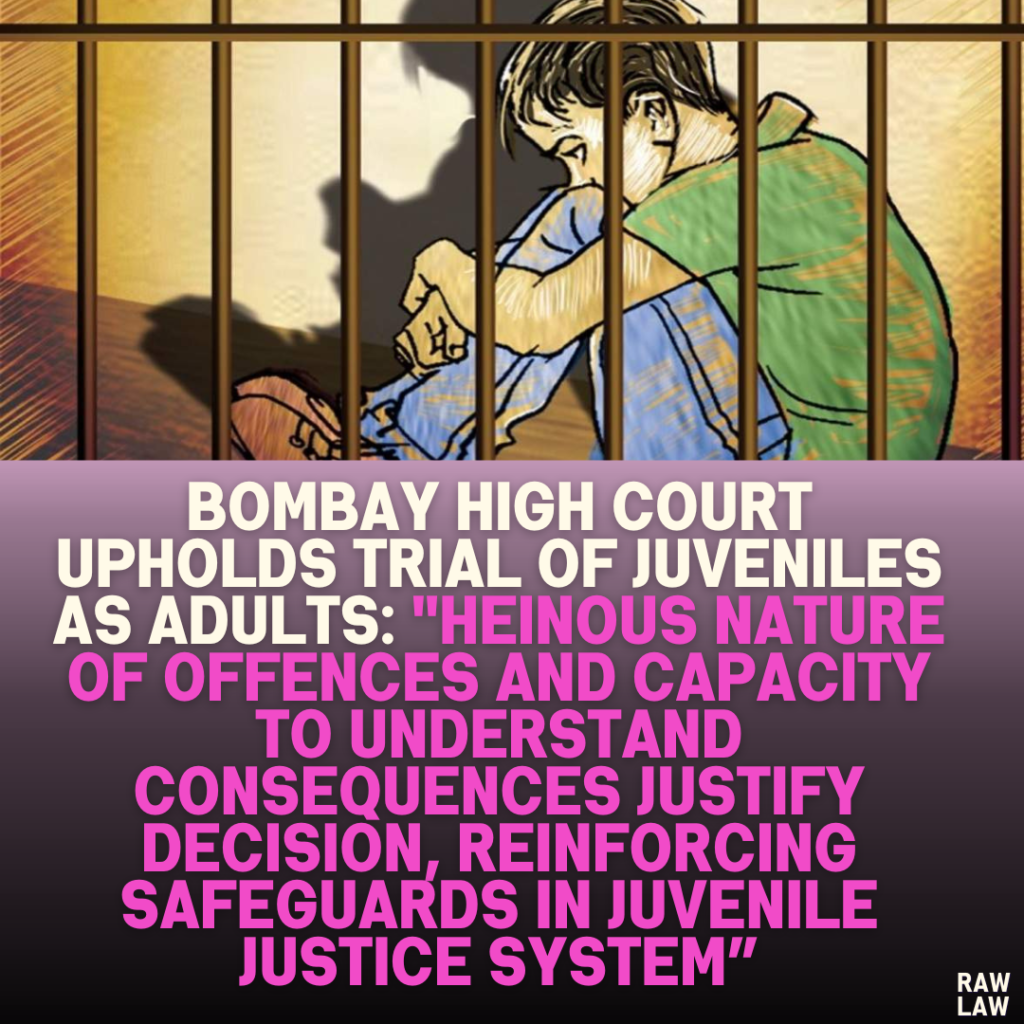Court’s Decision
The Bombay High Court dismissed the revision application filed by one of the juveniles (Child in Conflict with Law, “CCL No.1”). It upheld:
- The J.J.B.’s decision to try the juveniles as adults after a thorough preliminary assessment.
- The Additional Sessions Judge’s order, which confirmed the J.J.B.’s findings.
The Court held that the inquiry conducted by the J.J.B. complied with the law, and the materials on record sufficiently demonstrated the juveniles’ capacity to understand the consequences of their acts.
Facts
- Nature of Crime:
- The juveniles, aged between 16 and 18 at the time of the offence, were involved in a heinous crime: repeated sexual assaults on a 14-year-old minor.
- The offences included sedating the victim, threatening her, and involving other co-accused in the crime.
- Sequence of Events:
- Initially, the J.J.B. dealt with the juveniles under the provisions of the J.J. Act.
- The victim’s father applied for the juveniles to be tried as adults, leading to an inquiry under Sections 14 and 15 of the J.J. Act.
- After gathering a Social Investigation Report (SIR) and a Psychiatrist’s report, the J.J.B. concluded that the juveniles had the mental and physical capacity to commit the offences and ordered their trial as adults.
- This decision was upheld on appeal by the Additional Sessions Judge.
- Legal Challenge:
- CCL No.1 challenged these orders through a criminal revision application, arguing procedural lapses and insufficient evidence.
Issues
- Did the juveniles have the mental and physical capacity to commit the offences and understand their consequences?
- Was the preliminary assessment conducted in compliance with Sections 14 and 15 of the J.J. Act?
- Was further inquiry by the Children’s Court under Section 19(1)(i) required after the appeal?
Petitioner’s Arguments
The petitioner (CCL No.1) argued:
- Procedural Flaws:
- The preliminary inquiry was not completed within the timeline prescribed under the J.J. Act.
- The SIR and Psychiatrist’s reports were inconclusive and failed to prove mental and physical capacity.
- Non-compliance:
- The J.J.B. and appellate courts did not follow the proper procedure under Section 19(1)(i), which mandates further inquiry by the Children’s Court.
- Lack of Evidence:
- There was no conclusive material to justify trying the juveniles as adults.
Respondent’s Arguments
The respondents (State and victim’s father) contended:
- Compliance with Law:
- The J.J.B. conducted a thorough inquiry under Sections 14 and 15, including assessments by a Psychiatrist and Probation Officer.
- The timeline under Section 14 is directory, not mandatory.
- Nature of the Offences:
- The juveniles committed heinous crimes, including sedating the victim, threatening her, and involving others in repeated assaults.
- CCL No.1 displayed calculated behavior, such as administering sedatives and recording videos to blackmail the victim.
- Evidence on Record:
- The SIR and Psychiatrist’s report clearly established the juveniles’ capacity to understand the consequences of their actions.
Analysis of the Law
- Preliminary Assessment (Sections 14 and 15):
- Section 15 mandates a preliminary assessment for juveniles aged 16-18 involved in heinous offences, focusing on:
- Mental and physical capacity to commit the offence.
- Ability to understand its consequences.
- Circumstances under which the offence was committed.
- The Court held that the J.J.B. satisfied these criteria, relying on the reports and the nature of the crimes.
- Section 15 mandates a preliminary assessment for juveniles aged 16-18 involved in heinous offences, focusing on:
- Timelines under Section 14:
- The timeline for completing the inquiry is directory, not mandatory. Delays alone do not invalidate the inquiry if substantive compliance is achieved.
- Interchangeability of Courts:
- The terms “Children’s Court” and “Sessions Court” in the J.J. Act are interchangeable, as clarified by the Supreme Court. The Additional Sessions Judge, acting as a Children’s Court, properly upheld the J.J.B.’s decision.
Precedent Analysis
- Child in Conflict with Law vs. State of Karnataka:
- The Supreme Court ruled that timelines under the J.J. Act are not mandatory and can be extended for valid reasons.
- Ajeet Gurjar vs. State of Madhya Pradesh:
- The requirement for further inquiry under Section 19(1)(i) applies only when the J.J.B.’s order is not challenged in appeal. In this case, the appellate process replaced the need for further inquiry.
- Mumtaz Ahmed vs. State of Maharashtra:
- Differentiated as the evaluation reports in this case provided sufficient evidence of the juveniles’ capacity.
Court’s Reasoning
- Mental and Physical Capacity:
- The Psychiatrist’s report and the SIR established that the juveniles were mentally and physically capable of committing the offences.
- CCL No.1’s behavior, including planning and repeated exploitation, indicated a mature understanding of the consequences.
- Nature of the Offences:
- The sustained and calculated nature of the crimes demonstrated intent, understanding, and lack of immaturity.
- The Court noted that such heinous acts could not be attributed to momentary lapse or immaturity.
- Procedural Compliance:
- The J.J.B. and appellate courts adhered to the J.J. Act and relevant rules. The absence of further inquiry under Section 19(1)(i) was justified due to the appeal process.
Conclusion
The Court dismissed the revision application, affirming the decision to try the juveniles as adults. It emphasized that the heinous nature of the offences, combined with the juveniles’ capacity and intent, justified the decision.
Implications
This judgment reinforces:
- Safeguards in Juvenile Justice:
- Courts must ensure compliance with procedural safeguards while balancing justice for victims and rehabilitation for juveniles.
- Handling Heinous Crimes:
- Juveniles involved in serious offences can be tried as adults if they demonstrate capacity and intent.
- Clarity in Procedures:
- The decision clarifies the interchangeability of Children’s Courts and Sessions Courts, ensuring streamlined processes in juvenile cases.
